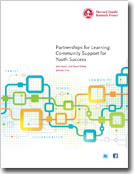The Harvard Family Research Project separated from the Harvard Graduate School of Education to become the Global Family Research Project as of January 1, 2017. It is no longer affiliated with Harvard University.

|
January 2013 Partnerships for Learning: Community Support for Youth SuccessErin Harris, Shani Wilkes |
Article Information
- Full Text (HTML)
- Full Text (PDF: 662 kb)
At-A-Glance
Who should read this paper: School principals and superintendents, out-of-school time and health care providers, and policymakers.
What you will learn: How to partner with others in your community to ensure positive learning outcomes for children and youth.
Key takeaways: The seven elements that are key to establishing successful and sustainable partnerships for learning.
There is strong evidence that, when schools partner with families and community-based organizations, these partnerships for learning improve children’s development and school success. They provide a seamless web of supports designed to ensure positive learning experiences for children and youth.
In this paper, we draw on the experiences of national organizations and a set of community schools that have built these learning partnerships, and examine seven key elements that we find to be essential in building them. Our paper serves as a guide to school districts and their partners as they consider whether and how to implement a partnerships for learning model. It also informs those who have already established these partnerships and wish to reflect on how to maximize partnership—and student—success.
The community school partners include the schools themselves, families, community-based organizations, health care providers, governmental agencies, and other service providers. Together these partners provide access to a broad range of supports in such areas as youth development, physical and mental health, family support, family and community engagement, and community development. Described in detail in the paper, the seven important elements that are key to developing successful and sustainable partnerships for learning are:
- Shared vision of learning,
- Shared leadership and governance,
- Complementary partnerships,
- Effective communications,
- Regular and consistent sharing of information about youth progress,
- Family engagement, and
- Collaborative staffing models.
We highlight examples from Elev8, a community schools initiative in several locations across the country, to illustrate what effective partnerships look like in practice. We also provide a selected list of additional resources for those interested in learning more about partnerships for learning and the common challenges they have faced.
Free. Available online only.
